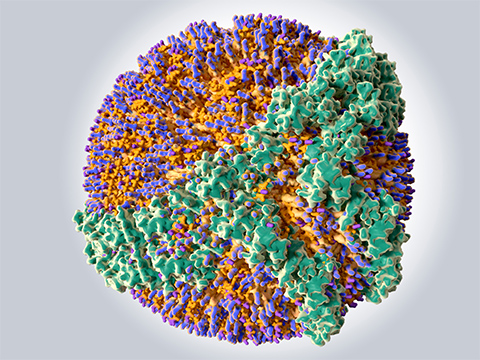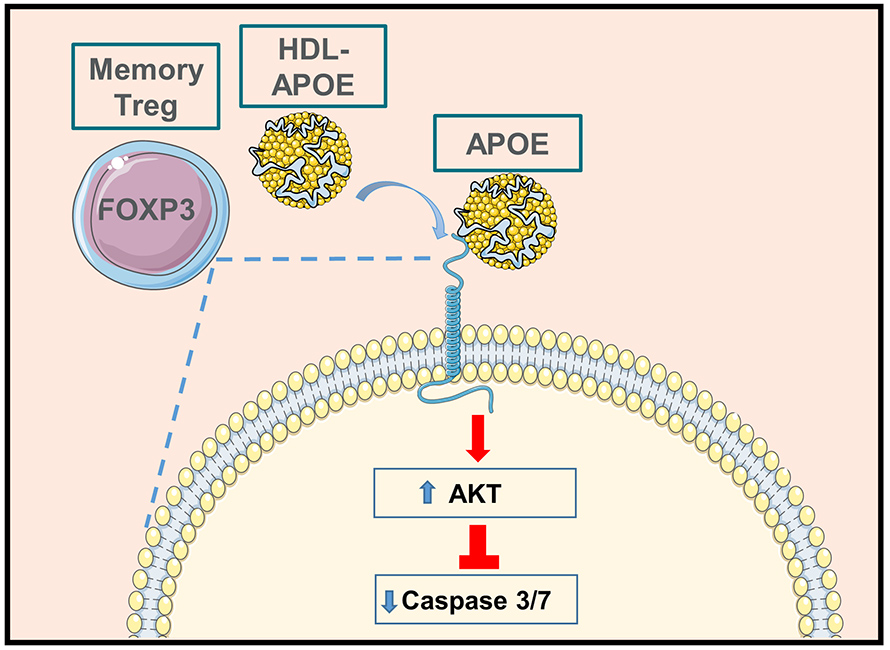There’s more than one way to be good
If you’ve had a blood test to check your cholesterol levels, your doctor probably told you both your so-called good, or high-density lipoprotein, and bad, or low-density lipoprotein, cholesterol levels. HDL is known for helping your body get rid of LDL, and this is great for your cardiovascular system; LDL is a component of atherosclerotic plaques that build up in arteries and lead to heart attacks.
However, researchers have begun to see that story as incomplete. Several groups at Cincinnati Children’s Hospital Medical Center and the University of Cincinnati College of Medicine working together recently published a study in the Journal of Lipid Research showing one way that HDL does much more than remove LDL.

Claire Chougnet is the lead author on the study “It has become clearer and clearer to the field that HDL is acting through other mechanisms,” she said, “particularly through immune modulating capacity.”
That the immune system influences cholesterol and health isn’t news. In fact, macrophages taking up LDL is one of the first steps down the path to developing atherosclerotic plaques in the arteries.
Macrophages are part of the innate immune system, however, and Chougnet and her group were interested in the other arm, the adaptive immune system, which has a less clear role in metabolic disease.
Laura Atehortua is the first author on the paper. “It is well known that innate immune cells recognize HDL,” she said, “so we wondered what is going to happen with adaptive immune response.”
Using human samples from blood banks, which requires meticulously repeating the experiments many times to account for the inherent variability in the samples, the researchers found that HDL can prevent cell death in T regulatory cells, or Tregs, a type of CD4+ T lymphocytes that are responsible for resolving inflammation.
Atehortua explained the role of Tregs. “They’re very important for immune system,” she said. “They’re the ones that say ‘oh it's enough.’”

Researchers have shown that the number of Tregs, which is regulated by the balance between Treg proliferation and Treg death, influences the overall level of inflammation in the body, which in turn influences atherosclerosis, metabolic diseases and other conditions including autoimmune diseases.
Once they found that HDL prevented Treg death, but not that of other CD4+ T lymphocytes, the researchers wanted to figure out what exactly in the HDL was having this effect, and they expected lipids to be the key. However, using reconstituted HDL particles lacking various components, they found that it wasn’t the lipid, but the proteins in the HDL particles that acted on Tregs to prevent their death.
“This was not at all what we expected,” Chougnet said. “The first surprise was that it was not the lipid but the protein, and the second surprise was that in the protein, it was a relatively minor protein not the major protein.”
The researchers found the prosurvival effect was mediated by apolipoprotein E, a protein found less abundantly on HDL than the more common apolipoprotein A.
This work may help scientists design better treatments for cardiovascular and metabolic diseases, as it highlights a potential point of intervention to reduce systemic inflammation.
Enjoy reading ASBMB Today?
Become a member to receive the print edition four times a year and the digital edition monthly.
Learn moreGet the latest from ASBMB Today
Enter your email address, and we’ll send you a weekly email with recent articles, interviews and more.
Latest in Science
Science highlights or most popular articles

Avoiding common figure errors in manuscript submissions
The three figure issues most often flagged during JBC’s data integrity review are background signal errors, image reuse and undeclared splicing errors. Learn how to avoid these and prevent mistakes that could impede publication.

Ragweed compound thwarts aggressive bladder and breast cancers
Scientists from the University of Michigan reveal the mechanism of action of ambrosin, a compound from ragweed, selectively attacks advanced bladder and breast cancer cells in cell-based models, highlighting its potential to treat advanced tumors.

Lipid-lowering therapies could help treat IBD
Genetic evidence shows that drugs that reduce cholesterol or triglyceride levels can either raise or lower inflammatory bowel disease risk by altering gut microbes and immune signaling.

Key regulator of cholesterol protects against Alzheimer’s disease
A new study identifies oxysterol-binding protein-related protein 6 as a central controller of brain cholesterol balance, with protective effects against Alzheimer’s-related neurodegeneration.

From humble beginnings to unlocking lysosomal secrets
Monther Abu–Remaileh will receive the ASBMB’s 2026 Walter A. Shaw Young Investigator Award in Lipid Research at the ASBMB Annual Meeting, March 7-10 in Washington, D.C.

Chemistry meets biology to thwart parasites
Margaret Phillips will receive the Alice and C. C. Wang Award in Molecular Parasitology at the ASBMB Annual Meeting, March 7-10 in Washington, D.C.

